As loving pet parents, we often want to share everything with our furry friends, including our meals. However, understanding What Human Food Can Dogs Not Have is crucial for their safety and well-being. While some human foods are perfectly safe and even healthy for dogs, many common household items can be incredibly dangerous, and some are toxic even in very small amounts. Pet poisonings are a significant concern, with hundreds of thousands occurring annually in the United States alone. Although not all these incidents are food-related, common human foods are a major contributor.
This detailed guide will serve as your essential resource, providing clear information on which human foods are strictly off-limits for your canine companion and why. Knowing these potential dangers is the first step in preventing accidental poisonings and keeping your beloved dog safe. For insights into safe dietary options, you might find our article on what can i give my dog to eat helpful.
Why Certain Human Foods Are Toxic to Dogs
Canine digestion and metabolism differ significantly from ours, explaining why many foods safe for humans are bad for dogs. Dogs’ bodies process certain substances in unique ways that can lead to toxicity.
For instance, compounds like theobromine and caffeine found in chocolate are metabolized much slower by dogs than by humans. This slower processing means these substances can rapidly accumulate in their system, leading to severe illness and potentially fatal consequences. Similarly, while cherries are a harmless snack for humans, their pits, stems, and leaves contain cyanide, which can be problematic if ingested in large quantities by a dog. Additionally, the pits themselves are hard for dogs to digest and can cause gastrointestinal upset or even an obstruction.
Food toxicity can also vary based on a dog’s size, breed, and overall health. A small amount of a toxic food might be more dangerous for a tiny Chihuahua than a large Great Dane. This highlights the importance of consulting your veterinarian if you have any questions about specific foods your dog should not eat.
Comprehensive List of Human Foods Dogs Cannot Have
Many household foods are dangerous, and often toxic, to dogs. Below is a detailed list of common foods that dogs must avoid. While this list is extensive, always remember it’s not entirely exhaustive. When in doubt, it’s best to err on the side of caution.
1. Alcohol
Because dogs are significantly smaller than humans, alcohol can have a much more severe and deadly effect on them. Even minimal amounts of alcohol can cause harm, with smaller pets being at higher risk. Symptoms of alcohol poisoning in dogs mirror those in humans, including vomiting, breathing difficulties, disorientation, coma, and in severe cases, death. Keep all alcoholic beverages and products containing alcohol far out of reach.
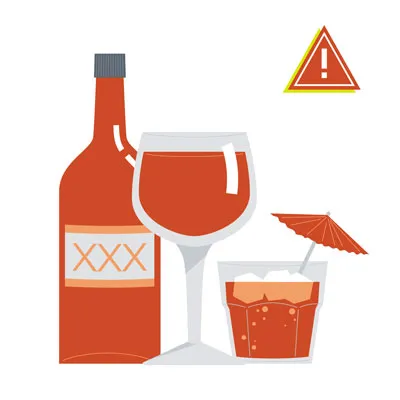 Alcoholic beverage being poured into a glass
Alcoholic beverage being poured into a glass
2. Apple, Apricot, Cherry, and Plum Seeds/Pits
While the fleshy part of apples is generally safe for dogs, the core and apple seeds are not. Apple seeds contain cyanide, and while small amounts may not be immediately harmful, it’s safest to avoid the core and seeds entirely. Similarly, the pits and seeds from apricots, cherries, peaches, and plums should be avoided. These fruit pits also contain cyanide, which can lead to severe symptoms such as vomiting, irregular heartbeat, seizures, coma, and even death, due to red blood cells’ inability to carry oxygen properly.
3. Avocado
Avocados are not a good choice for dogs. They contain a fungicidal toxin called persin, which is known to cause issues in many animal species. While dog deaths linked directly to persin from avocado are rare, large quantities can cause stomach upset and other problems. More critically, an intact avocado pit can cause a dangerous obstruction in a dog’s gastrointestinal tract, necessitating immediate veterinary intervention. Therefore, it’s best to keep avocados completely away from your canine companion.
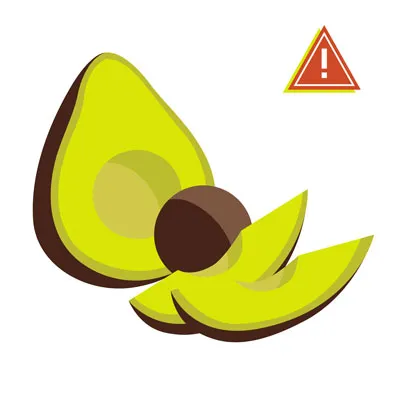 Freshly cut avocado with pit and knife
Freshly cut avocado with pit and knife
4. Broccoli (in large amounts)
Broccoli contains isothiocyanates, compounds that can be harmful to pets in very large doses. While very small amounts of plain, cooked broccoli might be tolerated occasionally, it’s generally best to avoid it, especially since numerous other safe and healthy food options are available. Broccoli stalks can also pose a choking hazard or cause gastrointestinal obstruction if not cut into very small pieces.
5. Caffeine and Coffee Grounds
Caffeine contains methylxanthines, which are highly toxic to dogs. Ingesting caffeine, whether from coffee grounds, tea bags, energy drinks, or even certain medications, can cause potentially fatal symptoms such as diarrhea, vomiting, seizures, and an irregular heartbeat. Even a small amount can significantly elevate your dog’s heart rate, leading to tremors, arrhythmia, and difficulty breathing.
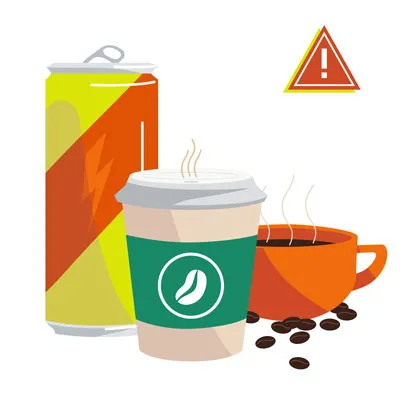 A cup of coffee with coffee beans and a French press
A cup of coffee with coffee beans and a French press
6. Chicken & Turkey Skin, Ham, and Other Fatty Cuts of Meat
When it comes to fatty meats like ham, bacon, or the skin from chicken or turkey, it’s always safer to dispose of them rather than offer them as treats. These items are bad for dogs due to their exceptionally high-fat content, which can trigger acute pancreatitis. Pancreatitis is a life-threatening illness in dogs, characterized by severe inflammation of the pancreas, leading to intense pain, vomiting, diarrhea, and other serious complications. Furthermore, never give cooked bones from turkey or chicken to your dog, as they can splinter, causing internal damage, obstruction, or even fatal abdominal infections. This includes meat from dinner, if you’re wondering what human food can dogs eat for dinner then these are definitely off the menu.
7. Chocolate
Chocolate toxicity is one of the most widely known dangers for dogs. It contains a lethal compound called theobromine, which dogs cannot metabolize efficiently. The darker the chocolate, the higher its concentration of theobromine, making baker’s chocolate and dark chocolate particularly dangerous. Chocolate also contains caffeine, another methylxanthine. Some sugar-free chocolates may additionally contain xylitol, further increasing their toxicity. Symptoms of chocolate ingestion range from hyperactivity, vomiting, diarrhea, and pancreatitis to abnormal heart rhythms and seizures. Even a tiny amount warrants an immediate call to your veterinarian.
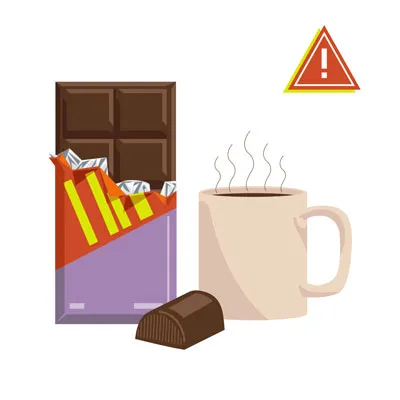 Broken pieces of dark chocolate
Broken pieces of dark chocolate
8. Grapes and Raisins
Grapes and raisins are exceptionally dangerous for dogs and can cause acute kidney failure. The toxic component, tartaric acid, directly impacts a dog’s kidneys, and even a few grapes or raisins can wreak havoc. Symptoms of grape or raisin poisoning include vomiting, diarrhea, loss of appetite, lethargy, and changes in urination patterns (either increased or no urine production). If you suspect your dog has eaten any amount of grapes or raisins, seek emergency veterinary care immediately.
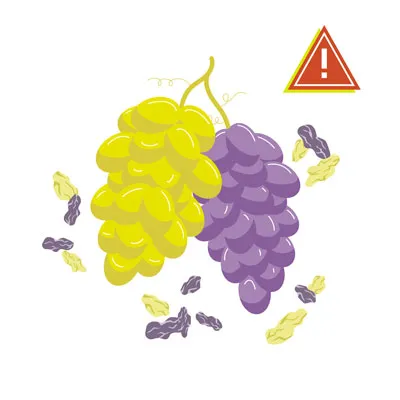 A bunch of ripe purple grapes
A bunch of ripe purple grapes
9. Macadamia Nuts, Almonds, and Pistachios
Macadamia nuts are highly toxic to dogs, causing painful symptoms such as weakness (particularly in the hind legs), overheating, tremors, and vomiting. The exact mechanism of toxicity is unknown, but as few as six nuts can cause severe poisoning in a small dog. While other nuts like almonds and pistachios are not as acutely toxic, they still pose risks. Their high-fat content can lead to pancreatitis, and they are significant choking hazards, especially if flavored or spiced. It’s generally best to keep all nuts away from your dog to ensure what is safe to feed dogs is strictly followed.
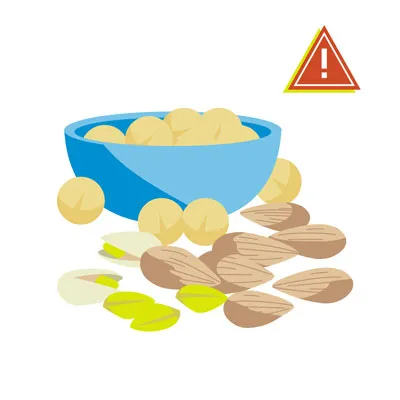 A pile of macadamia nuts
A pile of macadamia nuts
10. Milk and Dairy Products (with caution)
Milk and other dairy products should be approached on a case-by-case basis. While some dogs can consume them without issue, many are lactose intolerant or have dairy allergies, leading to gastrointestinal upset like diarrhea and gas. High-sugar and high-fat dairy products like ice cream are particularly bad due to their potential to cause stomach upset and pancreatitis. If you offer cheese, do so in very small quantities and opt for lower-fat varieties as an occasional treat.
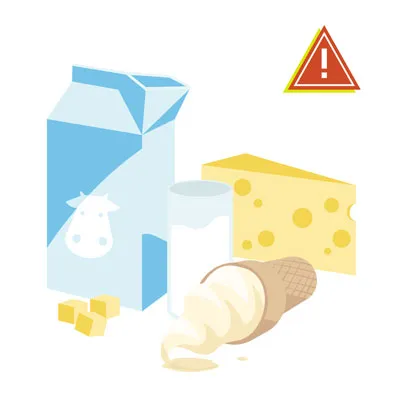 A glass of milk and cheese slices
A glass of milk and cheese slices
11. Mushrooms
It is safest to avoid feeding your dog any mushrooms, especially wild varieties. Wild mushrooms can contain a diverse range of toxins that may lead to kidney and liver failure, severe vomiting, diarrhea, hallucinations, and damage to red blood cells. While washed, white mushrooms from the grocery store might be considered safer by some, due to the difficulty in identifying truly safe mushrooms, it’s probably best to choose a different, unequivocally safe treat for your pup.
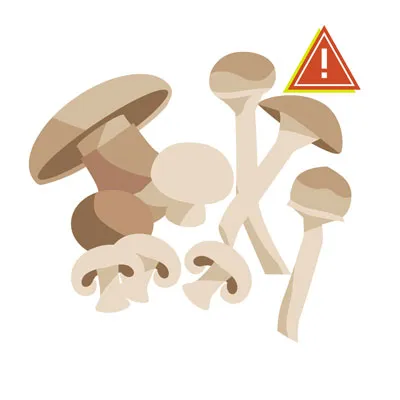 Various types of mushrooms on a wooden surface
Various types of mushrooms on a wooden surface
12. Nutmeg and Cinnamon
Dogs should never be fed foods containing nutmeg. This spice contains myristicin, a compound that can cause hallucinations, severe vomiting, disorientation, and central nervous system effects. The effects are more pronounced with higher doses or in smaller dogs.
Cinnamon, while not considered acutely toxic like nutmeg, should also be avoided in large quantities. It can irritate your dog’s mouth and digestive tract, leading to discomfort. In some cases, high consumption can lead to a drop in blood sugar, which can have serious health implications for your dog.
13. Onions, Garlic, Chives, and Leeks (Allium Family)
Many pet owners are surprised to learn that common herbs and vegetables from the allium family—including onions, garlic, chives, and leeks—are highly toxic to dogs. These plants contain sulfoxides and disulfides, which can damage a dog’s red blood cells, leading to hemolytic anemia. This condition can be life-threatening. Onion and garlic powders, found in many prepared human foods (even baby food), are concentrated forms of these toxins, making it crucial to read labels carefully. Certain Japanese breeds, such as Akitas and Shiba Inus, are particularly sensitive to allium plants, but they are dangerous for all dogs.
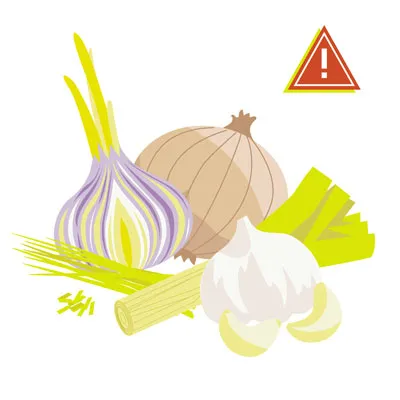 Various allium vegetables including onions, garlic, and chives
Various allium vegetables including onions, garlic, and chives
14. Salt
Excessive amounts of salt can disrupt the fluid balance in your dog’s cells, leading to sodium ion poisoning. Too much salt can cause tremors, seizures, vomiting, diarrhea, depression, and even coma or death. This includes not just table salt but also rock salt, homemade play dough, and salty snacks like potato chips. Always ensure your dog has access to fresh water and avoid feeding them overly salted foods.
15. Spicy Food
Keep your pup far away from any spicy food. Hot, spicy ingredients like chili peppers can cause severe gastrointestinal distress in dogs, including intense vomiting, stomach ulcers, diarrhea, and extreme discomfort. Not only is this painful for your dog, but it can also lead to costly emergency veterinary visits.
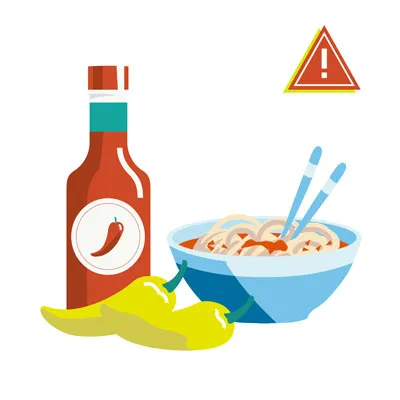 Various chili peppers, including red and green varieties
Various chili peppers, including red and green varieties
16. Sugar-Free Gum and Candy (Xylitol)
Xylitol is an artificial sweetener commonly found in many sugar-free human products, including gum, candy, baked goods, toothpaste, and some peanut butters. In dogs, xylitol causes a rapid and severe drop in blood sugar (hypoglycemia), which can lead to weakness, disorientation, seizures, and even liver failure. Even a small amount of xylitol can be deadly for a dog; for example, the xylitol in just five pieces of sugar-free gum has the potential to kill a 65-pound dog. Always check ingredient labels carefully, especially for peanut butter, to ensure it does not contain xylitol.
17. Tomatoes (Green Parts) and Raw Potatoes
Tomatoes and potatoes fall into a category where some forms are safe, while others are not. A ripened red tomato is generally safe for dogs in moderation. However, the green parts of the tomato plant, including the leaves, stems, and unripe green tomatoes, contain solanine, a toxic glycoalkaloid. Raw potatoes also contain solanine, which is poisonous to dogs. Cooked potatoes, plain and without additives, are generally safe in small amounts. Always ensure potatoes are thoroughly cooked and free of green spots.
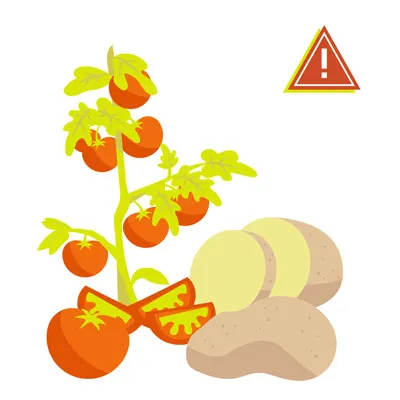 Ripe red tomatoes and raw potatoes
Ripe red tomatoes and raw potatoes
18. Tobacco
Tobacco products in any form are extremely dangerous and unhealthy for your dog. Nicotine, the active compound in tobacco, is a potent neurotoxin. Exposure can cause a wide range of severe symptoms, including vomiting, diarrhea, rapid or labored breathing, agitation, abnormal heart rate, wobbliness, muscle weakness, high or low blood pressure, seizures, and tremors. More significant or frequent exposure can lead to blue gums, coma, and can ultimately be fatal. Dogs are curious and may ingest discarded cigarettes, cigarette butts from ashtrays, or even nicotine vaping products. If your dog gets into tobacco, immediate veterinary attention is critical.
19. Yeast and Raw Dough
Yeast and raw dough are unsafe for dogs for several critical reasons. When ingested, raw dough can expand significantly in your dog’s warm stomach, leading to severe pain, bloating, and potentially life-threatening conditions like gastric torsion (bloat) or stomach rupture. Furthermore, the yeast and sugar in raw dough can ferment in the stomach, producing alcohol. This can quickly lead to alcohol toxicity, which requires immediate medical intervention and can be fatal.
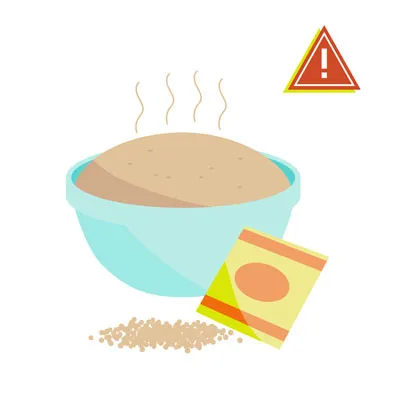 Raw bread dough in a bowl with yeast granules
Raw bread dough in a bowl with yeast granules
20. Raw Meat
Never feed your dog raw or undercooked meat. While some proponents advocate for raw diets, the potential risks of bacterial contamination outweigh any perceived benefits for most pets. Raw meat can harbor harmful bacteria such as Salmonella, E. coli, and Listeria, which can cause severe gastrointestinal illness in dogs, and can also be transmitted to humans. Additionally, raw meat often contains bones, which pose a significant choking hazard and can splinter, causing internal damage to your dog’s digestive tract. If you’re wondering what meat should your dog never eat, raw meat is at the top of the list due to these risks.
21. Rhubarb
Rhubarb, commonly used in human desserts, is not safe for pets. This plant contains soluble calcium oxalate crystals, primarily in its leaves. If ingested in large enough quantities, these crystals can bind with calcium in the body, causing a dangerous drop in blood calcium levels and potentially leading to acute kidney failure. Symptoms can include tremors, weakness, excessive drooling, bloody urine, changes in thirst and urination, and vomiting.
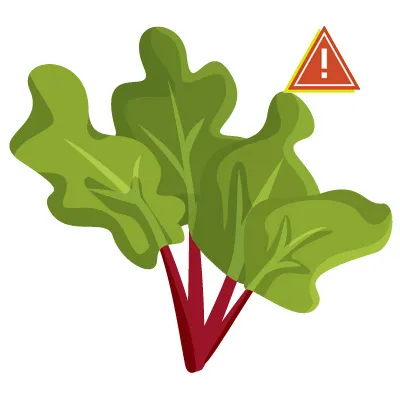 Freshly harvested rhubarb stalks
Freshly harvested rhubarb stalks
22. Star Fruit
Similar to rhubarb, star fruit also contains soluble calcium oxalate crystals. This makes star fruit unsafe for dogs, as ingestion can lead to similar kidney issues and other symptoms as seen with rhubarb. It’s best to prevent your dog from snacking on this exotic fruit.
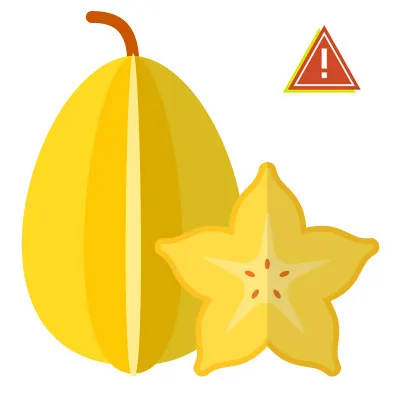 A sliced star fruit on a cutting board
A sliced star fruit on a cutting board
23. Flavored Water and Seltzer Water
It’s always best to give your dog fresh, clean, plain water rather than anything flavored or carbonated. Seltzer and flavored waters can contain added ingredients that are dangerous to pups, including sugar, artificial sweeteners (like xylitol), or excessive salt. Plain seltzer water might be okay in very small amounts if urgently needed, but the carbonation can cause gas and bloating, which can be uncomfortable for your dog. Stick to plain old H2O to be safe.
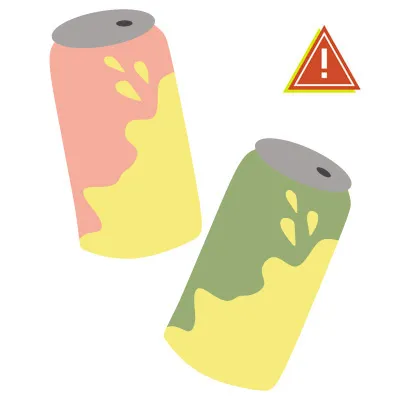 A glass of seltzer water with lemon slices
A glass of seltzer water with lemon slices
The Dangers of Specific Ingredients in Human Foods
Beyond individual food items, it’s important to understand specific compounds often found in human foods that pose significant threats to dogs:
- Xylitol: This artificial sweetener is a potent danger. As little as 0.1 gram per kilogram of body weight can cause a rapid and severe drop in blood sugar (hypoglycemia), while higher doses (0.5 g/kg) can lead to acute liver failure. Always check labels for products like sugar-free gum, candies, some peanut butters, and baked goods.
- Theobromine and Caffeine: Found in chocolate, coffee, and tea, these methylxanthines can overstimulate a dog’s nervous system and heart. Symptoms range from vomiting and diarrhea to seizures and fatal heart arrhythmias, with dark chocolate being the most dangerous.
- Allium Compounds: Present in onions, garlic, chives, and leeks, these compounds (sulfoxides and disulfides) directly damage red blood cells, leading to hemolytic anemia. Cooking does not eliminate their toxicity.
- Tartaric Acid: The specific toxin in grapes and raisins, tartaric acid, causes acute kidney failure in dogs, often with very small ingested amounts.
- Persin: Found in avocados, this fungicidal toxin can cause gastrointestinal upset and myocardial damage in some animals, though its effect on dogs is debated, the pit remains a physical hazard.
- Solanine: Present in the green parts of tomatoes and raw potatoes, solanine is a glycoalkaloid that can cause gastrointestinal distress, cardiac issues, and neurological symptoms.
Understanding these underlying toxic components helps reinforce why vigilance is paramount in controlling your dog’s diet.
What Dogs Are Most at Risk if They Consume Toxic Foods?
While all dogs are vulnerable to toxic foods, some are at a higher risk:
- Small Breeds vs. Large Breeds: Smaller dogs are generally more vulnerable due to their lower body weight. A small amount of a toxic substance will constitute a larger dose per pound for a smaller dog compared to a larger one, making them more susceptible to severe poisoning, especially with items like chocolate. Certain breeds, like what can french bulldogs eat and not eat, may also have specific sensitivities or digestive systems that react differently.
- Puppies: Young dogs have less developed digestive and immune systems, making them more susceptible to the harmful effects of certain substances. Their curiosity also makes them more prone to ingesting inappropriate items.
- Elderly Dogs: Older dogs may be at higher risk due to other underlying health conditions (e.g., liver or kidney disease) that can impair their ability to metabolize toxins.
- Dogs with Pre-existing Conditions: Dogs with chronic illnesses like diabetes, pancreatitis, or kidney disease are often more sensitive to dietary changes and toxins, putting them at greater risk of severe complications if they ingest harmful foods.
How to Prevent Your Dog from Eating Dangerous Human Foods
While accidents can happen, you can take proactive steps to significantly minimize the risk of your beloved pup getting into unsafe human food:
- Store Foods Out of Reach: The simplest and most effective method. Keep all dangerous items on high shelves, in locked cabinets, or in containers your dog cannot open. This includes groceries, leftovers, and items cooling on countertops.
- Avoid Feeding Dogs from Your Plate or the Kitchen: Do not establish a habit of feeding your dog scraps from your plate or offering treats while you are cooking. This teaches them to beg for human food and makes them more likely to try to snatch forbidden items. It is safest to only give your pup treats specifically formulated for dogs.
- Educate Family Members and Guests: Ensure everyone in your household, including children and visitors, understands which foods are off-limits for your dog. Stress that no matter how tempting it is, they should not sneak any human food to your pet.
- Be Extra Cautious During Holidays and Gatherings: Busy times, like holidays, can lead to distractions, making it easier for dogs to access forbidden foods. Be extra vigilant during parties, barbecues, or celebrations when food is abundant and supervision might be relaxed.
If your precautions fail and your dog eats something potentially toxic, being prepared can make all the difference. Keep contact information readily available for your veterinarian and a 24/7 pet emergency clinic or animal poison control hotline.
What to Do If Your Dog Eats Something Toxic
If you suspect your dog has eaten a toxic human food, immediate action is crucial.
First, familiarize yourself with common symptoms of food toxicity. These can vary depending on what was ingested but often include:
- Lethargy or unusual listlessness
- Vomiting (sometimes bloody)
- Diarrhea (sometimes bloody)
- Loss of appetite
- Abdominal pain or discomfort (stomach may feel hard or bloated)
- Excessive drooling
- Tremors or seizures
- Increased thirst or urination (or lack thereof)
- Changes in heart rate or breathing
- Disorientation or weakness
If you observe any of these symptoms or know your dog has ingested a toxic food, do the following:
- Call Your Veterinarian or Poison Control Immediately: Timing is vital. The sooner your dog receives professional help, the more successful treatment is likely to be, and the shorter their hospitalization may be.
- Be Ready with Information: Provide your veterinarian or the poison control center with as much detail as possible: the type of food eaten, the approximate amount consumed, the estimated time of ingestion, your dog’s breed, age, and weight, and any symptoms observed.
- Avoid Home Remedies Unless Instructed: Do not attempt to induce vomiting or administer any home remedies without explicit guidance from a veterinary professional. Depending on the substance, inducing vomiting can sometimes cause more harm (e.g., if the substance is corrosive or if your dog is already showing neurological signs).
Human Foods That ARE Safe for Dogs
While the list of foods that dogs cannot have is extensive, there are indeed many human foods that are safe and even beneficial for them in moderation. Some popular and safe options include:
- Apples, Oranges, and Bananas: Apple flesh (without core or seeds), small amounts of oranges (peeled and deseeded), and bananas (peeled) can be healthy treats.
- Blueberries and Blackberries: Rich in antioxidants, fiber, and vitamins, these berries are excellent choices.
- Cantaloupe, Mango, Peaches, Pears, Pineapples, and Watermelon: These fruits are safe as long as pits, seeds, and rinds are removed to prevent choking or toxicity. Watermelon, especially, is hydrating.
- Carrots, Cucumber, and Celery: Low in calories and crunchy, these vegetables make great treats, especially for dogs needing to watch their weight.
- Cheese: Small amounts of low-fat cheese can be given as a treat if your dog is not lactose intolerant.
- Eggs: Fully cooked, plain eggs (scrambled or boiled) are a fantastic source of protein and can help soothe an upset stomach.
- Peanuts, Peanut Butter, and Cashews: Unsalted, unflavored, and unsweetened (especially no xylitol) versions are safe in moderation due to high-fat content.
- Popcorn and Corn: Air-popped, plain popcorn (no butter, salt, or unpopped kernels) and corn kernels (off the cob, plain) are acceptable treats.
- Coconut and Honey: Small amounts of unsweetened coconut (flesh, milk, or oil, no shell) and honey are generally safe and can offer some health benefits.
- Shrimp and Fish: Plain, fully cooked, shelled, and de-boned shrimp and fish (like salmon or sardines) are excellent protein sources.
- Turkey: Plain, cooked turkey meat (no skin, fat, or bones) is a healthy and safe protein treat.
- Grains, Wheat, and Quinoa: Small amounts of cooked grains are generally fine, but monitor for allergic reactions.
- Green Beans: Raw, steamed, or canned (plain, low sodium) green beans are a healthy, low-calorie snack many dogs enjoy.
For a more in-depth look at what canine companions can enjoy from your plate, explore our article on what is safe to feed dogs.
Conclusion
Understanding what human food can dogs not have is a critical part of responsible pet ownership. From common snacks like chocolate and grapes to everyday kitchen staples like onions and garlic, the list of potentially toxic foods is significant. Being aware of these dangers, storing food safely, educating your family, and knowing the emergency steps to take can help you protect your dog from accidental poisoning.
While vigilance is key, remember there are many human foods that your dog can safely enjoy as occasional, healthy treats. Always introduce new foods slowly and in small quantities, and if you are ever unsure about a particular food, always consult your veterinarian. Their expert advice is invaluable in ensuring your furry friend maintains a healthy and safe diet.
References
- “Top 10 dog poisons,” Hilary Parker (5/2023), WebMD.
- “What happens if a dog eats chocolate?” (10/2023), Colorado State University.
- “Fruits and vegetables dogs can or can’t eat,” (3/2024), American Kennel Club.
- “What to do if your dog drinks alcohol,” Jerry Klein (7/2023), American Kennel Club.
- “Can dogs eat apples?” Hector Joy (12/2022), PetMD.
- “Can dogs eat plums?” Katie Koschalk (7/2023), Chewy.
- “Avocado (Persea spp) Toxicosis in Animals,” Cristine Hayes (9/2024), Merck Veterinary Manual.
- “People foods to avoid feeding your pets,” (n.d.), ASPCA.
- “People foods dogs can and can’t eat,” (3/2024), American Kennel Club.
- “Can dogs eat nuts?” Amanda Ardente (1/2023), PetMD.
- “Can dogs drink milk?” Sandra C. Mitchell (1/2024), PetMD.
- “Can dogs have nutmeg?” Barri J. Morrison (11/2023), PetMD.
- “Onion, garlic, chive, and leek poisoning in dogs,” Renee Schmid et al. (2024), VCA Animal Hospitals.
- “Can dogs eat tomatoes?” Anna Burke (10/2024), American Kennel Club.
- “Can dogs eat potatoes?” Katherine Ripley (11/2023), American Kennel Club.
- “What to do if your dog eats a cigarette butt,” (6/2023), American Kennel Club.
- “Dough & dogs: Why it’s bad and what you can do,” Lisa Goldstein (7/2024), Preventive Vet.
- “Rhubarb,” (n.d.), Pet Poison Helpline.
- “Can dogs drink carbonated water?” Heather Logue (n.d.), Rover.
- “What fruits can dogs eat?” Ellen Malmanger (2/2024), PetMD.
- “Can dogs have green beans?” Anna Burke (8/2022), American Kennel Club.
- “About pet food safety,” (4/2024), CDC.
